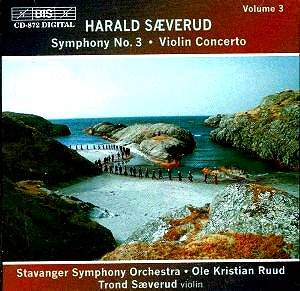The
soloist in the Violin Concerto is Trond Sæverud the
composer's grandson who premiered the Violin Concerto of Harald's
son, Ketil Hvoslef in London with the RPO in 1992. Trond Sæverud
has been the guiding hand behind the Sæverud celebrations
and the steady renaissance in interest since the centenary in
1997. If you like the Berg concerto perhaps re-imagined with voices
from Leifs, Frankel and Hartmann then this is certainly for you.
While
robust ears are needed for the rocky impacts and acid vituperation
of the first movement the folk accents of the neo-Baxian finale
make for an immediately accessible conclusion with a profusion
of rapid-fire rhythmic devices and succulent lyrical content.
The softer emotions are touched on in the middle movement.
The
work was premiered in Bergen by André Gertler (he who so
lovingly recorded the Hartmann for Supraphon) in 1962. It had
been commissioned by the Library of Congress through the Koussevitsky
Foundation. The 1950s saw an upsurge of interest in Sæverud
in the USA with Roy Harris's Pittsburgh festival sponsoring a
choral work in 1952 and the Minnesota Orchestra later commissioning
the Eighth Symphony.
The
earliest work included in these four discs is the Third Symphony.
It also happens to be the longest at almost three quarters of
an hour. The Symphony, in three towering movements, was written
in 1925-26 including material dating back to 1916. The composer
promoted the work to Monteux for an Amsterdam premiere but that
was not to be; the composer himself conducted it in Bergen (the
scene of so many Sæverud premieres) on 25 February 1932.
He had conducted the Second there in 1923. This contrasts with
the history of his First Symphony, a prentice work which incredibly
was premiered by the Berlin Phil while Sæverud was still
a student in the German capital.
There
is a long and morose, though always transparently clear, introduction.
Sæverud then introduces a light-heartedly playful bucolic
passage in which hiccuping woodwind play in a benevolent shadow
of the skittering woodwind in Berlioz's Marche au Supplice.
The long and concentrated andante with a hint of Hindemith
and tortured expressionism about it once again voices the woodwind
as the humanising agency. The allegro molto blasts along
in tumultuous conflict but manages to find some seared humour
among the bracken and blasted charcoal. It ends in an explosively
Beethovenian stomp.
The
Symphony has some warm though not idyllic writing. Its objectivity
leaves no room for Nordic romanticism. Rønnes' performing
edition is used. This carries the authority of association and
discussion between Rønnes and the composer. The original
version carries a 'Not to be used' injunction from the composer.
Two
works then: the early and sometimes expressionistic Third Symphony's
Germanic power contrasting with the substantial Violin Concerto
- a work the accessibility of which is belied by the impression
created by parts of the Leifs-like first movement.
Superbly
documented and recorded consistent with the Bis house standard.
Rob
Barnett
